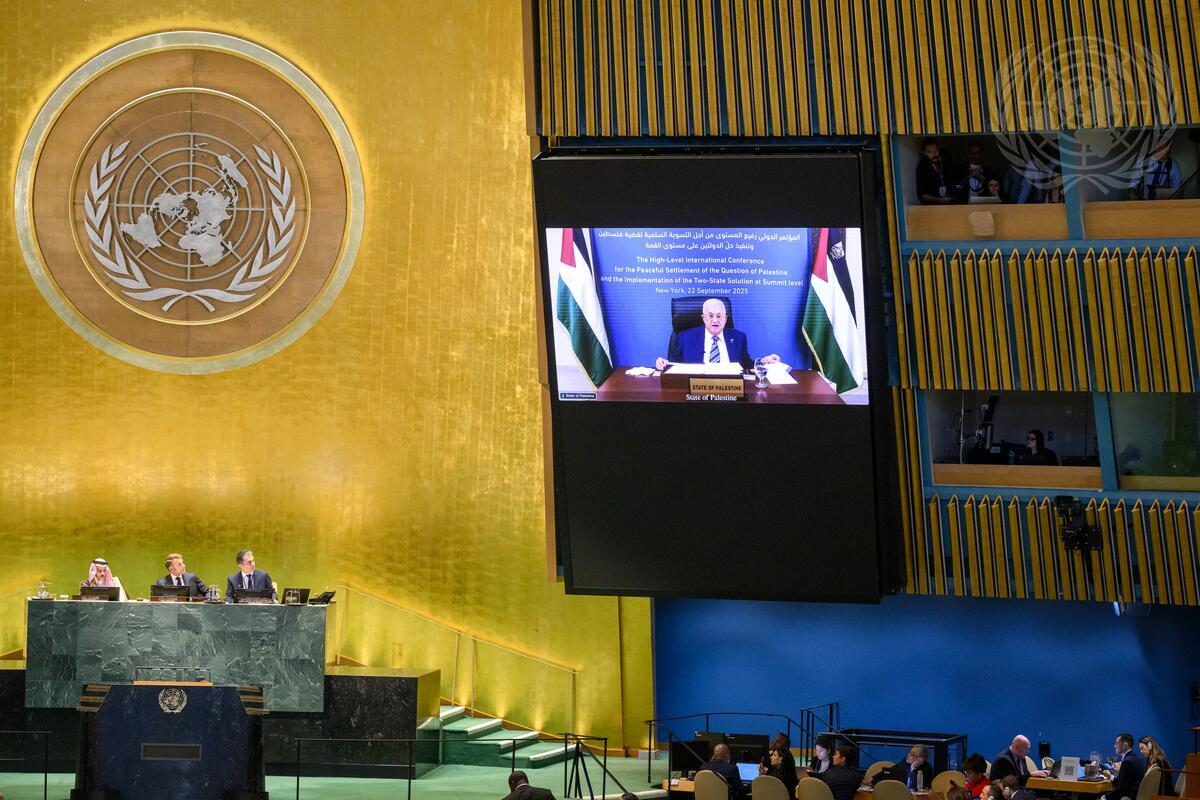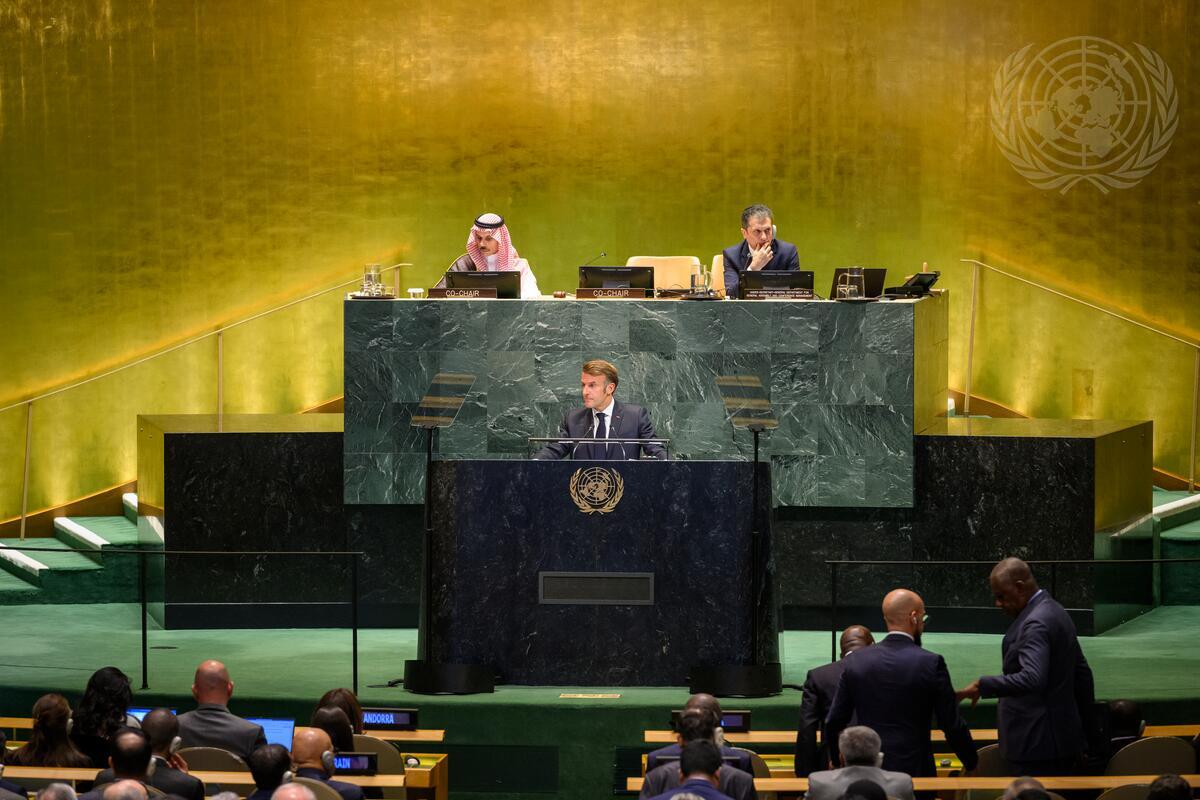Truthlytics covered the floor as French President Emmanuel Macron and Saudi Foreign Minister Prince Faisal bin Farhan Al Saud pressed for what they called the only workable exit from this cycle of grief and retaliation. Free the remaining hostages. Stop the fighting in Gaza. Move, finally, toward two states that can live side by side in security.
Macron: “The Time for Peace Has Come”
France crossed a line that had been debated for years. Macron announced that France recognizes the State of Palestine, arguing that recognition strengthens Israel’s long-term security rather than weakens it. He framed it as a commitment to peace and to a two-state horizon that the United Nations first sketched in 1947. France also said it would open an embassy in Palestine once hostages are released and floated an international role to stabilize Gaza after the guns fall silent. Those proposals drew loud applause inside the hall.
Macron’s refrain was simple. The time for peace has come. The war in Gaza has devastated civilians. Nothing justifies what is happening to families there. Hostages must come home. Antisemitism must be confronted wherever it appears. And Israelis and Palestinians deserve the same future-facing security that only a political settlement can deliver.
Saudi Arabia: Ending Aggression and Upholding International Law
Saudi Foreign Minister Prince Faisal bin Farhan words carried a similar urgency. He criticized Israel’s ongoing military operations as undermining peace and said the international community must finally act.
“The Israeli-Palestinian conflict has gone unresolved for generations,” he said. “International law has been breached and decades of diplomacy have come up short.”
He spoke directly about settlements and settler violence in the West Bank, calling them intolerable and politically unsustainable. His message was blunt: without two states living side by side, the region cannot escape this nightmare.

Abbas Speaks from Afar
Palestinian President Mahmoud Abbas addressed the General Assembly by video after the United States denied him a visa. The UN voted 145-5 to allow a remote address. He thanked countries recognizing Palestine and pushed again for full UN membership. In a notable line, he said Hamas and other factions must surrender their weapons to the Palestinian Authority and condemned the killing and detention of civilians including the Oct. 7 attacks. The remarks landed as both an appeal and a reassurance to governments that want a reformed PA to govern Gaza and the West Bank.
A Global Push for Recognition
France’s move did not happen in isolation. In the forty-eight hours around the high-level meetings, Britain, Canada, Australia and Portugal recognized the State of Palestine, citing the need to unlock a political path out of the war. That followed a European cluster where Belgium, Luxembourg, Malta, Andorra and Monaco also moved to recognition at UNGA. It is a visible shift among US allies who argue that recognition is a tool to create leverage for a two-state outcome, not a reward for violence.
The UN Secretary-General said statehood is a right, not a reward. That framing matters because it meets the argument that recognition somehow validates Hamas. It does not. It affirms a political horizon and places responsibility for security on state institutions that can be held to international law.
U.S. and Israel Stand Apart
The United States and Israel did not join the summit. Their delegations made clear that unilateral recognition of Palestine, in their view, risks rewarding Hamas and undermining negotiations. Israel’s ambassador to the UN dismissed the meeting outright as “a circus.” The tone was defiant, underscoring just how far apart the hall felt when France and Saudi Arabia laid out a roadmap for recognition.
The Policy Pieces That Follow Recognition
Recognition on its own does not change checkpoints or rebuild homes. In the speeches and side meetings, leaders sketched the hard follow-through.
- Hostages and ceasefire: The immediate priority remains the release of all hostages and an end to military operations in Gaza tied to a verifiable security framework. Paris and Riyadh presented these as linked steps, not separate files.
- Gaza stabilization: France floated an international role to stabilize Gaza after the war, with disarmament of Hamas and the PA taking administrative control. Details will be contentious, but the idea now sits in the center of the room.
- West Bank conditions: Settlement growth and settler violence are named as political deal-breakers by governments that just took the risk of recognition. They want to see those actions halted if a diplomatic track is going to hold.
- Mutual recognition: France asked Arab and Muslim states to reaffirm recognition of Israel as Europe recognizes Palestine, moving both tracks together so that the end state is two secure neighbors, not an isolated one.
Temperature of the Room
On the floor, there is a mix of relief and doubt. Relief among diplomats who have argued for years that you cannot ask Palestinians to wait for a state that never arrives. Doubt because Israel’s government rejects Palestinian statehood outright and warns of annexation in response to recognition. That is the collision everyone here understands and that will define the next weeks of talks.
For families of hostages and for families in Gaza, the language about cycles and horizons only matters if it changes facts on the ground. That is why the new recognitions are paired with demands for real steps: hostages home, guns quiet, humanitarian access scaled up, Palestinian institutions reformed to govern and be accountable, and a hard stop to actions that erase the two-state map.
Macron put it this way inside the hall. Peace is harder than war. It asks more from leaders and it asks more from all of us. Watching the applause around him, and the silence from others, it felt like the world had moved one square forward on a long board. The question is whether it holds.





